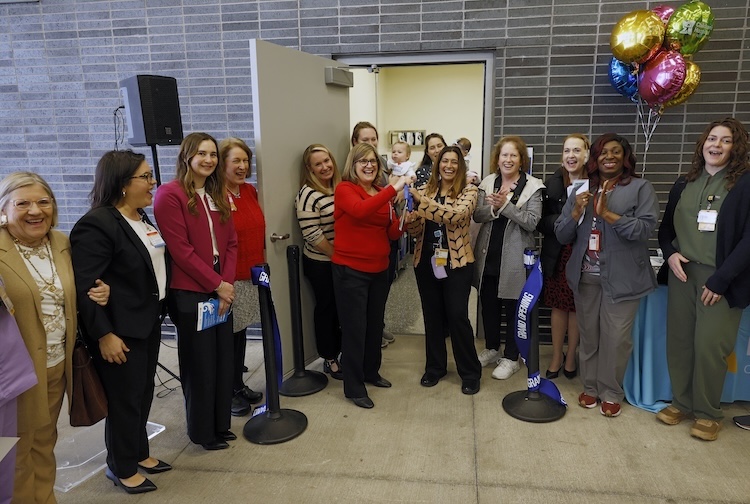When the game doesn’t end: Understanding gambling addiction in a tech-driven world
Changes in gambling culture and technology have increased the odds for developing gambling addiction, VCU expert says.
September 29, 2025 Since 2018, internet searches seeking help for gambling addiction have gone up by 23% nationwide. (Getty Images)
Since 2018, internet searches seeking help for gambling addiction have gone up by 23% nationwide. (Getty Images)
By Olivia Trani
Placing a bet is only a few clicks away. With sports betting apps to online poker rising in popularity across the United States, so has problem gambling and gambling disorder.
Research shows that internet searches seeking help for gambling addiction have increased by 23% nationally since 2018 – the same year a U.S. Supreme Court legalized sports betting.
“The level of gambling has grown astronomically across the country, especially in Virginia, so it is not surprising that more people are developing problems from their gambling,” said Carolyn E. Hawley, Ph.D., CRC, a professor in the Department of Rehabilitation and Mental Health Counseling at the VCU College of Health Professions. Hawley is also the president of the Virginia Council on Problem Gambling and the executive director of the Virginia Partnership for Gaming and Health.
VCU Health News spoke to Hawley about how gambling has evolved over the years and the impact this shift has had on our health.
 Carolyn E. Hawley, PhD, CRC, is a professor in the Department of Rehabilitation and Mental Health Counseling at VCU College of Health Professions. (Contributed photo)
Carolyn E. Hawley, PhD, CRC, is a professor in the Department of Rehabilitation and Mental Health Counseling at VCU College of Health Professions. (Contributed photo)
How common has problem gambling become over the past few years?
As part of my role with the Virginia Council on Problem Gambling, we lead the Virginia Problem Gambling Helpline, which provides support for individuals in need of resources and treatment services.
Between 2019 and 2024, the number of people calling our helpline in Virginia has tripled. We’ve also seen about a 1,500% increase in total calls to the helpline during this same period. So not only are we seeing increases in the number of people seeking help for problem gambling, but they are also seeking help more frequently.
Who is most affected by problem gambling?
We have seen shifts in the average age of people engaging in problematic gambling. In recent years, problematic gambling behavior has become especially common in young adults. The number of helpline callers between ages 18-24 have grown by more than 60% since 2019. Before sports betting was legalized, we often had callers between ages 46-65 who were playing the lottery.
What factors are contributing to this rise in gambling and gambling addiction?
The increasing legality of gambling has been a big factor. For many decades, only three forms of gambling were legal in Virginia: the lottery, horse racing and charitable gambling like fundraisers. Since 2019, several additional forms of gambling – both in person and online – have become legal in the state, including sports betting, historical horse racing, Texas hold’em poker tournaments, AI lottery and brick and mortar casinos. There is currently a push to legalize skill games and slot machines in Virginia as well.
These recently legalized forms of gambling also make gambling more accessible. With the availability of online sports wagering, people can gamble 24 hours a day, seven days a week. Rather than going to a casino or going to a convenience store to buy a lottery ticket, you now can make wagers by simply pressing buttons on your phone.
Another factor is that gambling has become more normalized in our culture, especially sports betting. Sports networks have their own gambling sites and sports announcers are no longer just talking about plays, but they also talk about what wagers are being made. We also see parents setting up sports betting accounts for their underage kids. This is concerning since the younger someone starts gambling, the more likely they are to develop an addiction.
How has technology influenced problematic gambling behavior?
Not only has technology made gambling more accessible, but it’s also made gambling more addictive.
For example, slot machines traditionally used to have a single line for placing bets, but now the machines allow people to make bets on more than 20 different lines all at once. This kind of gambling means that people are more likely to win at least one bet, which entices them to continue gambling, even if they are losing money. Say you wager $10 dollars and win $5. Even though you’re losing $5 overall, the machine makes celebratory sounds that make you feel like you’re a winner.
Online games take advantage of this mentality as well. These apps track your play patterns and learn the best time to prompt you to play more. So even when you try to take a break from gambling, the apps may give you a $10 bonus to entice you to come back. Now with improvements in artificial intelligence, we will likely see even more strategies for getting people to gamble more.
These kinds of technological advancements have led to concerning trends in how quickly people are developing gambling problems. Previously people would gamble for years or even decades before feeling the need to see health professionals for help. Now it’s becoming more common to have people seeking support for gambling problems that have been gambling in under a year.
What broader message do you hope people take away from this work (research)?
The path forward requires a comprehensive and unified approach to prevention, treatment and recovery, including diverse stakeholders. We need to create more awareness about problem gambling to minimize its development and reduce barriers to seeking help. The key takeaway from our research is that this isn’t an individual problem, this is a community and public health issue. With more understanding we can reduce stigma, aid healthier choices and foster stronger communities.
Understanding problem gambling: Warning signs and how to get help




